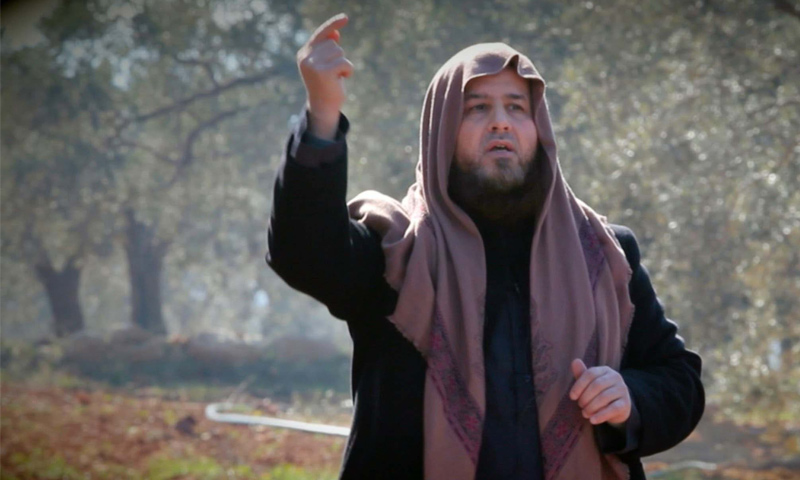The vision and statements of the head of Hayat Tahrir al-Sham, Hashim al-Shaykh (Abu Jaber, an engineer by profession) about the fighting in northern Syrian have been absent for some time, and have been replaced by talk of al-Shaykh being marginalized and prevented from taking decisions, in light of internal divisions within the faction.
In light of the frequent confrontations and clashes, which are getting closer to Idlib and the Bab al-Hawa border crossing to Turkey, al-Shaykh did not declare his position on the fighting against Harakat Ahrar al-Sham al-Islamiyya (Islamic Movement of the Free Men of the Levant). Al-Shaykh previously led the faction, taking over from Hassan Abboud (Abu Abdullah al-Hamawi), who was killed along with a number of other senior leaders of the group in the countryside of Idlib in September 2014.
After the end of his term in 2015, al-Shaykh served as a member of the movement’s Shura Council. He then formed the so-called “Army of Free Men” in December 2016 and was supported in doing so by the prominent military leader Abu Saleh al-Tahan. The move was seen as a “soft split” inside the movement.
This interpretation was confirmed by the faction’s move to join Hayat Tahrir al-Sham when it was formed in January 2017, appointing Abu Jaber as its leader.
The fierce fighting in Idlib between two factions that he had led was not sufficient to push al-Shaykh, a science engineer originally from the town of Maskanah in the eastern countryside of Aleppo, to publicly declare his position, raising many questions.
Since he took over the leadership of Hayat Tahrir al-Sham, al-Shaykh has rarely made public appearances, and his statements and declarations were limited to introducing the movement. On the other hand, the movement’s military leader, Abu Mohammad al-Julani, recently appeared in battles in Hama at the end of March. There are rumors that he now holds decision-making power within the faction.
This is considered to be against the leader’s positions, since he explicitly declared his views on ISIS when he was the imam of the central mosque of Maskanah, and he was known for his firm decisions when he was head of the movement. However, he has been less prominent ever since he took over as head of Hayat Tahrir al-Sham.
In March, the US described Abu Jaber and other members of the organization, other than the al-Nusra Front, as “background actors who have no role in the new formation”. The US considers the real power broker to be al-Julani, “who is operationally in control. His and his group’s approach is to dominate, which is just another face of tyranny”. Others who hold “superficial” positions, such as Abu Jaber, are just background actors, according to Michael Ratney, the US envoy to Syria.
In a statement published by the Foreign Ministry, the US envoy stated, “al-Julani and his gang have done everything they can to enter and hide like parasites in the body of the Syrian revolution, and they then started engulfing it from the inside.”
When he was part of the movement, al-Shaykh always called for “supporting the Syrian revolution by forming a Sunni alliance that stands against projects and conspiracies against it”. He considered Syria as the first line of defense against Iranian ambitions in the region.
Al-Shaykh’s only position during the fighting is a tweet that was posted on a twitter account that carries his name, which was created two days ago. The tweet says, “The Syrian arena has reached a crossroads and jihad is a trust that we hold. Either we preserve it and its gains or its sacrifices will go in vain into the hands of political adventurers and provocative fatwas.”
The account also tweeted, “Ahrar al-Sham sought to strengthen its soldiers’ position by spreading rumors, accusations and lies against Hayat Tahrir al-Sham’s project through field visits and organized information campaigns.”
However, activists are skeptical that the account belongs to al-Shaykh, especially as it was created after the beginning of the fighting.
The calls to leave Hayat Tahrir al-Sham and accusations of treachery by leaders of Ahrar al-Sham continue to pursue al-Shaykh to this day. The latest accusations came from senior leader Farouk Abu Bakr, who described al-Shaykh as “a traitor to the revolution”. In a video published on Friday July 21, Abu Bakr declared, “shame on al-Julani and the traitor Hashim al-Shaykh Abu Jaber”.

